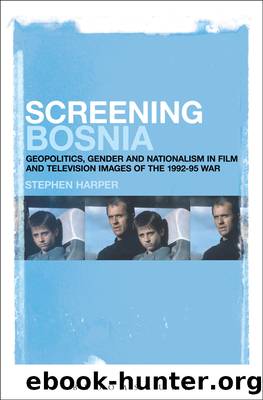Screening Bosnia by Stephen Harper

Author:Stephen Harper [Harper, Stephen]
Language: eng
Format: epub
Tags: Social Science, Media Studies, Performing Arts, Film, History & Criticism
ISBN: 9781623565923
Google: TezUDQAAQBAJ
Barnesnoble:
Goodreads: 38884202
Publisher: Continuum
Published: 2017-03-09T03:31:27+00:00
Conclusion
Although he began the war as a âhumanitarian interventionistâ, Michael Ignatieff (1998: 95) afterwards expressed doubts about his initial position on the war, wondering whether the Westâs bombing to âendâ the Bosnian war had in fact been underpinned by narcissism and whether âwe intervened not to save others, but to save ourselves, or rather an image of ourselves as defenders of universal decenciesâ. As the foregoing discussion shows, Bosnian war action films express something of this moralistic investment in the war. Through melodramatic and Manichean assertions of US or Western military and humanitarian superiority, these films âprovide a way of solving (geo)political uncertainty [â¦] providing moral geographies and making clear the lines between âusâ and âthemââ (Power and Crampton 2007: 6). While not all of the films go as far as Killing Season in reimagining the Bosnian war as a US ground invasion to âliberate the campsâ, they are all informed by the values of rugged individualism, the urgent and pragmatic imperative of âgetting the job doneâ and an unswerving sense of righteousness.
James Chapman (2008) traces three âlineagesâ within the history of war film: war as spectacle, war as tragedy and war as adventure. The films discussed in the foregoing chapter invoke both the first and the last of these categories. All of these films mobilize the patriotic, masculinist and colonialist tropes typical of Western action adventure narratives (tellingly, the only Bosnian war action film to defy these tropes â and to belong to Chapmanâs âtragicâ category âis a Croatian-Bosnian production, The Living and the Dead, as discussed in Chapter 6). They are all also racist films that, almost without exception, heroize white action heroes and demonize their not-quite-white adversaries. Indeed, as Martin Green (1980: 226) reminds us, âadventure has been a white idea as well as a male idea; it has been the means by which the people of one particular culture have taken possession of most of the globeâ. More specifically, appearing during or shortly after the Hague criminal trials, these films entrench the notion of collective Serb guilt and reproduce the stereotype of the psychopathic Serb war criminal. In the Western imaginary, the Balkans, of course, have long figured as âa terrain of ethnic horror and intolerance, of primitive irrational bellicose passionsâ (Žižek 2011: 47), as indicated by the very title of journalist Harry deWindtâs 1907 Balkan travelogue Through Savage Europe. And given the prevalence of images of Balkan bellicosity in contemporary journalistic commentary about Bosnia â British journalist Michael Nicholson (1994: 16) likened the people of the Balkans to the âAmazonâs Yanamamo, one of the worldâs most savage and primitive tribesâ âit is unsurprising that these films also invoke the fantasmatic figure of the Balkan Wild Man, a revenge-driven, sadistic and perverted primitive whose rampages can only be stopped by a civilizing counterforce. These films suggest that Western intervention, however violent, is a source of enlightenment and that, as Bill Clinton (1999: 17) put it in his defence of the NATO bombing of Yugoslavia in 1999, âthe Balkans are not fated to be the heart of darknessâ.
Download
This site does not store any files on its server. We only index and link to content provided by other sites. Please contact the content providers to delete copyright contents if any and email us, we'll remove relevant links or contents immediately.
Still Foolin’ ’Em by Billy Crystal(36352)
Spell It Out by David Crystal(36114)
The Great Music City by Andrea Baker(31921)
Professional Troublemaker by Luvvie Ajayi Jones(29652)
Trainspotting by Irvine Welsh(21647)
Call Me by Your Name by André Aciman(20505)
The Secret History by Donna Tartt(19065)
We're Going to Need More Wine by Gabrielle Union(19038)
Cat's cradle by Kurt Vonnegut(15343)
Ready Player One by Cline Ernest(14652)
Molly's Game by Molly Bloom(14139)
Bombshells: Glamour Girls of a Lifetime by Sullivan Steve(14062)
The Goal (Off-Campus #4) by Elle Kennedy(13658)
Leonardo da Vinci by Walter Isaacson(13321)
4 3 2 1: A Novel by Paul Auster(12382)
The Social Justice Warrior Handbook by Lisa De Pasquale(12189)
The Break by Marian Keyes(9361)
Crazy Rich Asians by Kevin Kwan(9282)
The remains of the day by Kazuo Ishiguro(8983)
